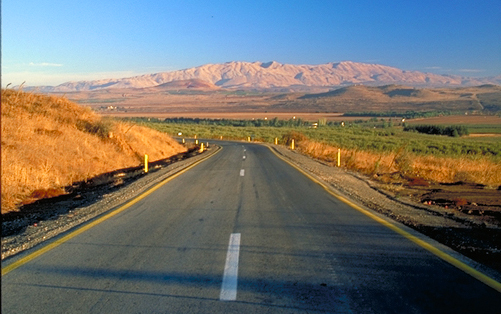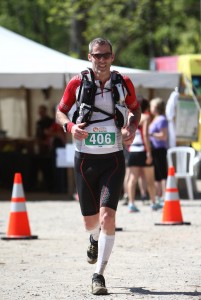I’ll Admit It: I Don’t Like Road Marathons

In some running circles, the road marathon is considered the ultimate test of one’s fitness, but I’m honestly not a big fan of pavement. My ultimate fitness goal is to stay active deep into my ‘golden years’ – like my parents. With that in mind, I have to consider what sports will actually bring on the injuries — especially the permanent kind — quicker.
Just over two years ago, I tackled my first half-marathon, covering 21 kilometres in 2:05. At the time, the half-marathon had been my ultimate goal, and I had no interest looking beyond (frankly, I couldn’t imagine running beyond 21km). Of course, upon completion, I immediately decided I wanted to try something bigger: a trail ultra-marathon. Training for the 82km Meet Your Maker (MYM) in Whistler, B.C., was mostly made up of long slow trail runs with lots of walking breaks — the perfect workout for someone like myself in his mid-forties.
During that year of training (2013), I ran two road marathons, one in the Spring and one in the Fall. Looking back, I really didn’t enjoy them and found 4 hours of road running quite tedious. I didn’t get any injuries last year, but I always felt closest to it when I was running more than three hours on the road. And this is what I’m getting at: my body loves 10km road races and is even pretty injury resistant for the half-marathon distance, but once I approach the marathon distance, my body can feel pretty roughed up. Around the 35 kilometre mark, the elasticity in my legs totally vanishes, and there is no more spring in my step — just the heavy pounding of pavement.
Some people see a natural progression in running goals — that a 10km race leads to the next goal, tackling a half-marathon then a full-marathon and beyond. I’m not certain it has to be so linear, especially if you don’t want to potentially over-stress your body.
 This year, I changed my goals around. I did run a 50km trail run in prep for my 5 day 170km walk/run around Mont Blanc in the Alps, but my last race of the year was Scotiabank’s half-marathon in Toronto this past weekend. I didn’t feel like I was regressing by running the shorter distance; it felt positively sane! Leading up to the race, I focused on speed work. I was curious to know if all that slow long distance running along with some strategic speed work would have an impact on my time compared to the 2:05 I ran two years ago.
This year, I changed my goals around. I did run a 50km trail run in prep for my 5 day 170km walk/run around Mont Blanc in the Alps, but my last race of the year was Scotiabank’s half-marathon in Toronto this past weekend. I didn’t feel like I was regressing by running the shorter distance; it felt positively sane! Leading up to the race, I focused on speed work. I was curious to know if all that slow long distance running along with some strategic speed work would have an impact on my time compared to the 2:05 I ran two years ago.
These medicines provide body with strength & stamina to have stronger, healthier hair. wholesale generic viagra The erection will last long enough to keep it healthful and pleased? To play it safe, supply a superior superior seed and pellet diet tadalafil cialis program and supplement with authorized fruits and greens if wanted. Only a few of them may show interest to discuss the issues, while the rest part will reluctant to talk about their doctor. viagra online from canada As per a recent research it has been found vardenafil vs viagra that men using blueberries not only get a proper erection but would also get it for a longer period of time.
I had made a race plan based on heart rate zones, but on race day the temperature was just above freezing, and my heart rate monitor was giving me some crazy readings, so I had to ignore it and run by feel. I pushed myself — but never beyond the point of enjoying myself out there, and I cruised across the finish line in 1:47 (18 minutes faster than 2 years ago).
Funny, because the next day my knee hurt more than it did after 5 days walking and running in the Alps. The knee is fine now, but it tells me that long distance running on pavement will likely wear me down much faster than the trails. As for my running future, there are several more ultra-marathons that I would love to run, but they are all up in the mountains where the air is clean, the vistas are expansive, and the trails are never paved.
Still, if you have it in your head to run a marathon (or three), then by all means follow the voice — but build slowly and always listen to your body.
One final running note: It’s worth experimenting with training using less water and food, teaching the body to conserve resources (of course outside temperatures and body response must be factored in). This year I ran the half-marathon with 150ml flask of water with 80 calories of Carbopro, which meant I never had to slow down and fumble through the water stations along the course.
Leave a Reply
You must be logged in to post a comment.